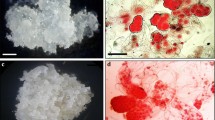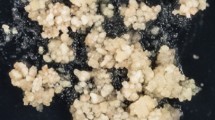Summary
A method was developed to induce desiccation tolerance in microspore-derived embryos ofBrassica napus. Treatment of 14- to 20-day-old embryos with 1×10−4 M abscisic acid, in the light, induced tolerance to slow desiccation over a 6-day period. Under these conditions 88 to 100% of embryos of the five cultivars tested survived (as measured by moisture uptake, greening, and growth of the shoot and root meristem) after storage for 1 wk at tissue water content levels of less than 20%. The response was found to be dependent on the abscisic acid concentration in the culture medium and time of exposure of the embryos to the abscisic acid-containing medium, with exposure times of as little as 1 day having a beneficial effect. Exposure times to abscisic acid (ABA) of 5–7 days resulted in the highest survival rates. Embryo age and size at the time of ABA exposure also affected the subsequent survival and development of embryos, with older and larger embryos exhibiting the best responses.
Similar content being viewed by others
References
Anandarajah, K.; Kott, L.; Beversdorf, W. D., et al. Induction of desiccation tolerance in microspore-derived embryos ofBrassica napus L. by thermal stress. Plant Sci. 77(1):119–124; 1991.
Bartels, D.; Singh, M.; Salamini, F. Onset of desiccation tolerance during development of the barley embryo. Planta 175(4):485–492; 1988.
Bochicchio, A.; Vazzana, C.; Raschi, A., et al. Effect of desiccation in isolated embryos of maize during onset of desiccation tolerance during development. Agronomie 8(1):29–36; 1988.
Cenkowski, S.; Sokhansanj, S.; Sosulski, F. W. The effect of drying temperature on green color and chlorophyll content of canola seed. Can. Inst. Food Sci. Technol. J. 22:383–386; 1989.
Compton, M. E.; Benton, C. M.; Gray, D. J., et al. Plant recovery from maize somatic embryos subjected to controlled relative humidity dehydration. In Vitro Cell. Dev. Biol. 28P:197–201; 1992.
Drew, R. K. L. The development of carrot (Daucus carota L.) embryos (derived from cell suspension culture) into plantlets on a sugar free medium. Hortic. Res. 19:79–84; 1979.
Gamborg, O. L.; Miller, R. A.; Ojima, K. Nutrient requirements of suspension cultures of soybean root cells. Exp. Cell Res. 50:151–158; 1968.
Gray, D. J.; Conger, B. V.; Songstad, D. D. Desiccated quiescent somatic embryos of orchardgrass for use as synthetic seeds. In Vitro Cell. Dev. Biol. 23:29–33; 1987.
Herter, U.; Burris, J. S. Preconditioning reduces the susceptibility to drying injury in corn seed. Can. J. Plant Sci. 69(3):775–790; 1989.
Huang, B.; Keller, W. A. Microspore culture technology. J. Tissue Cult. Methods 12:171–178; 1989.
Janick, J.; Kitto, S. L.; Dim, V. H. Production of synthetic seed by desiccation and encapsulation. In Vitro Cell. Dev. Biol. 25:1167–1172; 1989.
Kaimori, N.; Takahashi, N. Plant regeneration from dried callus of carrot (Daucus carota L.). Jpn. J. Breed. 39:379–382; 1989.
Kermode, A. R.; Dumbroff, E. B.; Bewley, J. D. The role of maturation drying in the transition from seed development to germination VII. Effects of partial and complete desiccation on abscisic acid levels and sensitivity inRicinus communis L. seeds. J. Exp. Bot. 40:303–314; 1989.
Kermode, A. R.; Bewley, J. D. The role of maturation drying in the transition from seed development to germination V. Responses of the immature castor bean embryos to isolation from the whole seed a comparison with premature desiccation. J. Exp. Bot. 39:487–498; 1988.
Kermode, A. R.; Pramanik, S. K.; Bewley, J. D. The role of maturation drying in the transition from seed development to germination VI. Desiccation-induced changes in messenger RNA populations within the endosperm ofRicinus communis 1 seeds. J. Exp. Bot. 40:33–42; 1989.
Kim, Y-H.; Janick, J. ABA and polyox-encapsulation or high humidity increases survival of desiccated somatic embryos of celery. HortSci. 24:674–676; 1989.
Kim, Y-H.; Janick, J. Abscisic acid and proline improve desiccation tolerance and increase fatty acid content of celery somatic embryos. Plant Cell Tissue Organ Cult. 24:83–89; 1991.
Koster, K. L.; Leopold, A. C. Sugars and desiccation tolerance in seeds. Plant Physiol. 88:829–832; 1988.
Kott, L. S.; Beversdorf, W. D. Enhanced plant regulation from microspore-derived embryos ofBrassica napus by chilling partial desiccation and age selection. Plant Cell Tissue Organ Cult. 23:187–192; 1990.
McKersie, B. D.; Senaratna, T.; Bowley, S. R., et al. Application of artificial seed technology in the production of hybrid alfalfa (Medicago sativa L.). In Vitro Cell. Dev. Biol. 25:1183–1188; 1989.
Morris, P. C.; Kumar, A.; Bowles, D. J., et al. Osmotic stress and abscisic acid induce expression of the wheat EM genes. Eur. J. Biochem. 190:625–630; 1990.
Murashige, T. The impact of plant tissue culture on agriculture. In: Thorpe, T. A., ed. Frontiers of plant tissue culture 1978. Calgary, Alberta: University of Calgary; 1978;15–26.
Park, H. B.; Kim, Y. H.; Whipkey, A., et al. Proline and ABA increase survival of desiccated somatic embryos of celery. Hortscience 23:754; 1988.
Pechan, P. M.; Bartels, D.; Brown, D. C. W., et al. mRNA and protein changes associated with induction ofBrassica microspore embryogenesis. Physiol. Plant 184:161–165; 1991.
Redenbaugh, K.; Slade, D.; Viss, P., et al. Encapsulation of somatic embryos in synthetic seed coats. Hort. Sci. 22:803–809; 1987.
Redenbaugh, K.; Fujii, J.; Slade, D., et al. Artificial seeds—encapsulated somatic embryos. In: Bajaj, Y. P. S., ed. Biotechnology in agriculture and forestry, vol. 17. Berlin: Springer-Verlag; 1991;395–415.
Senaratna, T.; McKersie, B. D.; Bowley, S. R. Desiccation tolerance of alfalfaMedicago sativa L. somatic embryos influence of abscisic acid stress pretreatment and drying rates. Plant Sci. 65:253–260; 1989.
Senaratna, T.; McKersie, B. D.; Bowley, S. R. Artificial seeds of alfalfaMedicago sativa L. induction of desiccation tolerance in somatic embryos. In Vitro Cell. Dev. Biol. 26:85–90; 1990.
Senaratna, T.; Kott, L.; Beversdorf, W. D., et al. Desiccation of microspore derived embryos of oilseed rape Brassica napus L. Plant Cell Rep. 10:342–344; 1991.
Shimonishi, K.; Ishikawa, M.; Suzuki, S., et al. Cryopreservation of melon somatic embryos by desiccation method. Jpn. J. Breed. 41:347–352; 1991.
Takahata, Y.; Brown, D. C. W.; Keller, W. A., et al. Dessication tolerance in broccoli (Brassica oleracea L.) microspore-derived embryos. Jpn. J. Breed. 40:92–93; 1990.
Weast, R. C., editor. Handbook of chemistry and physics, 57th ed. Cleveland, OH: CRC Press; 1977;E-46.
Williamson, J. D.; Quatrano, R. S.; Cuming, A. C. Em polypeptide and its message RNA levels are modulated by abscisic acid during embryogenesis in wheat. Eur. J. Biochem. 152:501–507; 1985.
Winston, P. W.; Bates, D. H. Saturated solutions for the control of humidity in biological research. Ecology 41:232–237; 1960.
Author information
Authors and Affiliations
Rights and permissions
About this article
Cite this article
Brown, D.C.W., Watson, E.M. & Pechan, P.M. Induction of desiccation tolerance in microspore-derived embryos ofBrassica napus . In Vitro Cell Dev Biol - Plant 29, 113–118 (1993). https://doi.org/10.1007/BF02632281
Received:
Accepted:
Issue Date:
DOI: https://doi.org/10.1007/BF02632281




